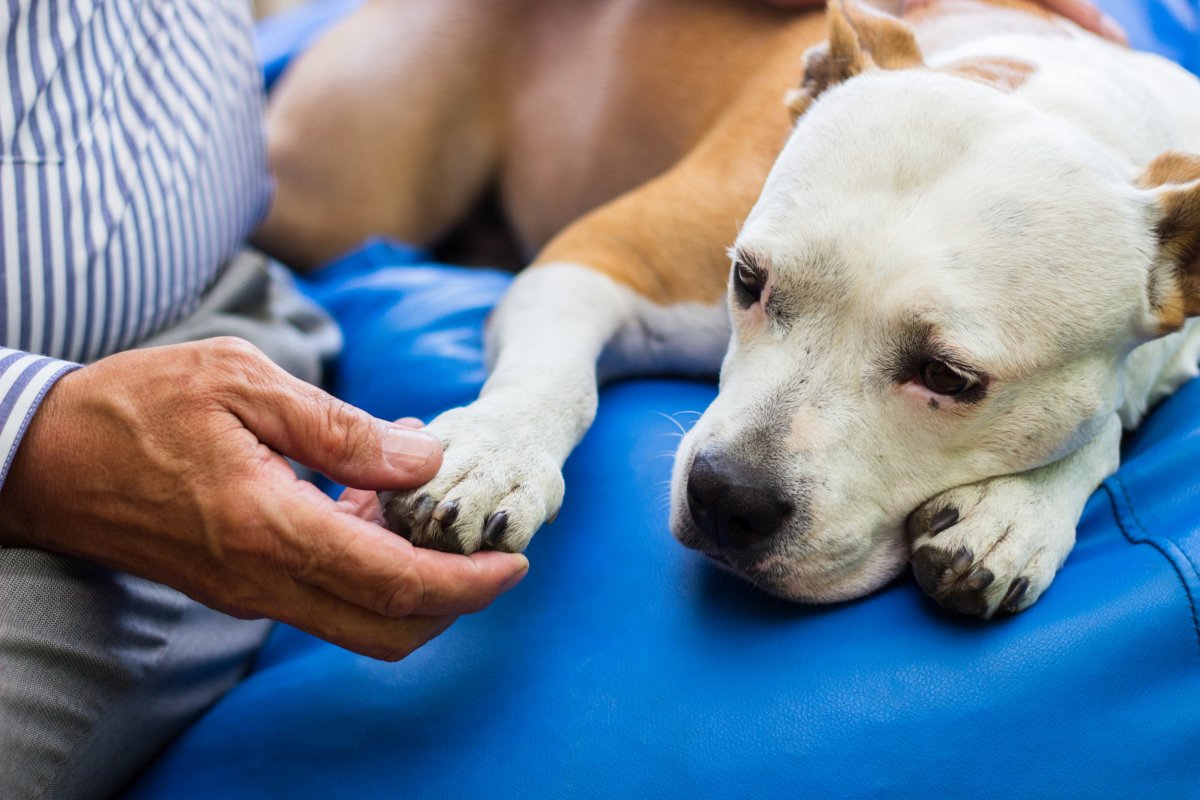Some people who feel significantly down during certain seasons may be experiencing seasonal affective disorder (SAD), a type of depression.
But ever notice your normally bright-eyed, bushy-tailed dog appear to down or display some other sign of low mood at certain times of the year? Could man's best friend be suffering from SAD too?
Newsweek asked the experts if dogs can get SAD and whether seasonal changes can affect your pet's mood.
What Is Seasonal Affective Disorder (SAD)?
Seasonal affective disorder is a type of depression noted by its recurrent seasonal pattern. SAD is marked by "significant changes in your mood and behavior" during a change in season. Symptoms of SAD, which last about four to five months per year, include those associated with major depression, the NIMH says.
Some symptoms of major depression include losing interest in activities you once enjoyed, sleep issues, low energy, a feeling of hopelessness, difficulty concentrating and feeling depressed most of the day, nearly every day.
In most instances, SAD comes in the form of "winter depression," which sees symptoms arise in late autumn or early winter before disappearing in the spring and summer.

Dogs and Emotions
There's no doubt that dogs are incredibly perceptive and sensitive beings, with the ability to sense emotions and read the facial expressions of humans.
The American Kennel Club (AKC) says previous studies have shown dogs combine hearing and sight to correspond happy and angry human faces with happy and angry vocalizations.
Researchers have found that dogs can distinguish the positive sound of laughing from the negative sound of crying. The dogs were found to be more upset and stimulated by the negative sounds than positive ones.
A 2018 study published in Scientific Report, a peer-reviewed online journal published by Nature Research, showed that dogs can determine human emotions using only their ears (at least for happiness, fear and sadness). They use the right side of their brain for processing negative emotions and the left side for positive ones.
A 2016 study published in The Royal Society's Biology Letters, a peer-review online journal, showed dogs can recognize emotions in humans using information from different senses, which the study said is an ability that had never previously been observed outside of humans.
Do Dogs Feel Sadness?
The short answer? Yes and no. Speaking to Newsweek, the AKC's chief veterinary officer, Dr. Jerry Klein, explained dogs can certainly become depressed and anxious. There have been reports of dogs experiencing depression and loneliness following the loss of an owner or a "fellow member" of their pack, be it a human or another animal, as well as a change from their normal routine, Klein explained.
"But whether or not dogs get 'sad' is a little less certain," Klein told Newsweek.
Klein said from a strictly scientific standpoint, there isn't "strong evidence" that dogs feel what people would classify as sadness. "Dogs live more in the moment and don't have the 'self-consciousness' or the tendency to inwardly ponder like people do."
Speaking to Newsweek, Dr. Jose Arce, the president of the American Veterinary Medical Association (AVMA), echoed Klein's thoughts, noting that we don't know if dogs feel sadness in the same way humans do. However, dogs can definitely experience negative emotional states such as stress, anxiety, and depression.
Klein also noted there is the argument that if dogs do experience sadness, it is usually short lived.

Can Dogs Get SAD?
The AVMA's Arce told Newsweek: "There's no evidence that dogs suffer from seasonal affective disorder like humans do."
The AKC's Klein explained that until recently, there hasn't been an official diagnosis of SAD in an animal, as there was no model for it. However, recent studies on hamsters and grass rats may prove that seasonal changes can negatively affect animals as well.
"When exposed to less sunlight, hamsters and rats acted depressed. The study discovered that there was an alteration in the chemistry of the rodents' brains. The hippocampus (area of the brain) shrank, which is thought to be a reason for depression," Klein said.
While the study hasn't been directly conducted on dogs, it indicates that the chance of SAD affecting dogs is possible, and that animals can experience changes in brain chemistry and mood during periods of shorter days and less light, the AKC's chief veterinary officer said.
"A more real possibility is that SAD indirectly affects dogs because of how their owners act and feel when they are depressed during periods of less light," according to Klein.
Veterinarians at the People's Dispensary for Sick Animals, a U.K. veterinary charity, also say "pets can't actually suffer with SAD," according to an October 2020 PDSA article.
The charity explains: "If they [dogs] seem a little off over the gloomier months, this could just be because we're [the owners] feeling down and we naturally project our feelings onto our pets."
Certified animal behavior consultant Steve Dale told PetMD, a pet health website featuring articles written by veterinarians, in 2017 that the moods of pets are mirrored by that of their owners.
"If we're moody around the house all day, cats and dogs can pick up on this," Dale said.
Dale also said when dogs appear to be down over the winter months, it could potentially be an indication of boredom, with them naturally engaging in less activity outdoors during the colder months.
Dr. Karen Becker, an integrative and wellness veterinarian, told PetMD in 2017 that some dogs also sleep more and are less energetic during the winter. This raises the question of whether their symptoms are a result of their owners being less active and engaged with their pets, "rather than true seasonal depression," she said at the time.

Impact of Daylight on Dog Mood
Dale explained humans and dogs share much of the same brain chemistry, such as how the hormones melatonin and serotonin are impacted by daylight. An increase in daylight sees the brain produce more melatonin and less serotonin and both changes can have an adverse impact on mood.
Therefore, Dale noted it is entirely possible that dogs can get SAD but there may be other explanations, noting the limitation of there being no way to objectively measure or diagnose SAD in pets.
Becker also said reduced sunlight can cause Light Responsive Alopecia (also known as Seasonal Flank Alopecia) in dogs.
Becker told PetMD that scientists believe the condition comes from a lack of sunlight exposure to the pineal gland, so dogs living in northern climates are more affected than those in sunnier, southern climates.
Signs of Depression in Dogs
The AKC's Klein explained signs of depression can include loss of energy or interest in doing the types of activities one would normally enjoy as well a loss of appetite and a change in body posture (a dropped head or tail) may also be noticed.
Klein warned that it is extremely important that any dog displaying signs of a change in behavior or appetite always be examined by a veterinarian to rule out an underlying medical issue or pain. A medical condition would manifest the same symptoms, so owners should not assume that these changes are based strictly on depression.
Other signs to look out for that may indicate your dog may be experiencing negative emotional states such as depression and anxiety include not engaging with other family members, whimpering or howling, aggression and changes in sleep patterns, the AVMA's Arce told Newsweek.
Arce also highlighted the importance of talking to a veterinarian when owners notice these types of behavior changes. If the reason for these symptoms are purely behavioral, your veterinarian can recommend ways to help your dog. such as "behavior modification, environmental enrichment, and the use of medications developed to treat depression or anxiety in dogs."
Dr. Leslie Sinn, a certified professional dog trainer and Diplomate of the American College of Veterinary Behaviorists (ACVB), told the AKC in April that an underlying medical condition or chronic pain can trigger symptoms of depression.
"In general, if a dog is slowing down or is reluctant to engage, especially in the absence of some life-changing event, then I would bet huge amounts of money that it is medical or pain-related," she told the AKC.
What to Do if Your Dog Is Sad
Apart from contacting your veterinarian as previously mentioned, Klein recommends increasing sunlight exposure by waking up a little earlier and getting more exercise outdoors. Exercise and activity also make a great remedy for boredom for both you and your dog, he added.
Arce explained dogs are creatures of habit and the change in seasons often leads to a change in routines—such as darker, colder days may mean shorter walks or less frequent trips to the dog park than during the warmer months.
"This disruption of their routine, combined with less physical and mental exercise, could lead to signs of depression in dogs during the cold winter months," he said.
The AVMA president noted owners can still provide "the emotional safety and security of a consistent routine" by replacing warmer weather activities with other ways for their dogs to play, explore and bond with them indoors. This could include designated time for indoor play, encouraging foraging behavior with puzzle toys or snuffle mats or learning some new dog tricks."
The use of artificial sunlamps is often considered as a treatment for humans with SAD, however Klein explained there is no evidence to suggest this will work for dogs.

Uncommon Knowledge
Newsweek is committed to challenging conventional wisdom and finding connections in the search for common ground.
Newsweek is committed to challenging conventional wisdom and finding connections in the search for common ground.
About the writer
Soo Kim is a Newsweek reporter based in London, U.K. She covers various lifestyle stories, specializing in travel and health.
Soo ... Read more
To read how Newsweek uses AI as a newsroom tool, Click here.








